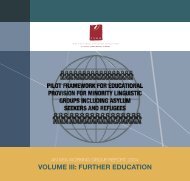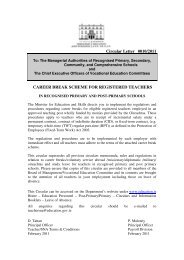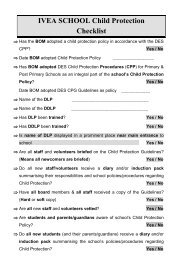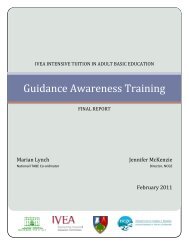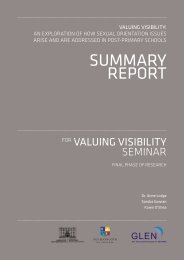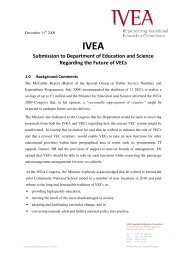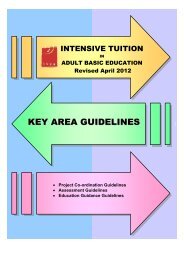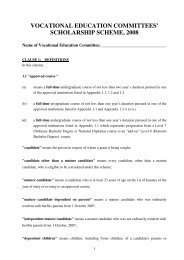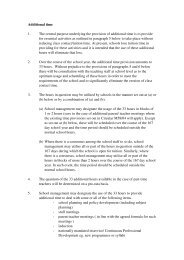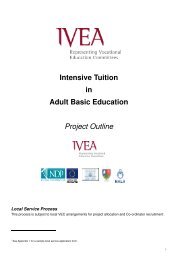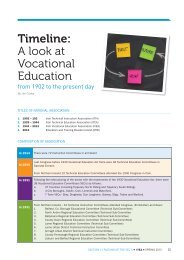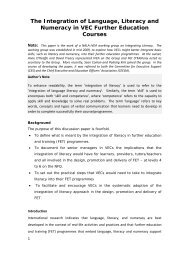Download File - IVEA
Download File - IVEA
Download File - IVEA
You also want an ePaper? Increase the reach of your titles
YUMPU automatically turns print PDFs into web optimized ePapers that Google loves.
9 CONCLUSION<br />
9.1 THE ROLE OF MANAGEMENT<br />
Senior management at both VEC and institutional levels has an important<br />
role to play in the implementation of the policy to provide a service for the<br />
client group.<br />
VEC Level:<br />
At VEC level senior management needs to familiarise itself with the<br />
recommended policy and adapt it to the particular circumstances of<br />
their own VEC. They also need to ensure that the resources and training<br />
necessary to implement the policy are put in place or are sought from<br />
the Department of Education and Science. If the issues around provision<br />
for bilingual/EAL learners are to be resolved it is important that senior<br />
management engage in dialogue through the <strong>IVEA</strong> and the APVSCC 87<br />
to develop and implement a cohesive national response by VECs to the<br />
needs of bilingual/EAL learners.<br />
Institutional Level:<br />
The principal has a key role within an institutional setting. This fact is borne<br />
out by research into curriculum and policy development. It is vital that<br />
the principal takes the lead in introducing the policy to the educational<br />
institution, in allocating resources to it, in ensuring that the service is fully<br />
integrated into the life of the school and in creating the supportive culture<br />
necessary for a policy, in such a sensitive area, to succeed.<br />
9.2 IMPLEMENTATION<br />
<strong>IVEA</strong> will support the delivery of the recommendations outlined in the<br />
present document through the revised structures to be recommended by<br />
the strategic review presently being conducted by Pricewaterhouse Cooper.<br />
At school level, it is recommended that each school consider allocating<br />
responsibility for the implementation of the recommendations of the<br />
present report to an Assistant Principal of Special Duties as appropriate.<br />
This should be done within the context of a whole school approach to<br />
interculturalism and inclusion. As outlined in chapter 5, every teacher has a<br />
responsibility to contribute to creating an inclusive and intercultural school.<br />
It is recommended that the terms of reference of the post of responsibility<br />
include a requirement to undertake training in interculturalism.<br />
Opportunities to attend regular inservice training should be made available<br />
in order to remain in touch with current practice and new methodology.<br />
9.3 CONCLUSION<br />
This document is intended to serve as a framework in which VECs and second<br />
level schools within VECs can meet the needs of bilingual/EAL learners.<br />
The Department of Education and Science-compiled Draft<br />
Recommendations Towards a National Action Plan Against<br />
Racism states:<br />
Future polices must be developed within the context of a rights<br />
based equality approach, catering for diversity as the norm within<br />
all education settings. This approach needs to be taken account<br />
of in the intrinsic design of systems 88 .<br />
Incorporating such an approach, the aims of the present document are to:<br />
• Prepare the school community for dealing with bilingual/EAL learners;<br />
• Enable schools to integrate bilingual/EAL learners into the school<br />
learning programme;<br />
• Enable schools to provide language and cultural supports to enable<br />
participation;<br />
• Empower students to follow the mainstream curriculum in the school<br />
programme if appropriate;<br />
• Enable schools to provide support services.<br />
The present publication locates second level provision for bilingual/EAL<br />
learners within an equality and human rights framework and builds<br />
on national policy as enunciated in publications such as the National<br />
Children’s Strategy (2000). It also fits into the general <strong>IVEA</strong> policy<br />
framework, the work of the Dublin VECs and national and international<br />
research on the educational needs of bilingual/EAL learners. The<br />
document is also located within a national and international legal context.<br />
The present document forms part of a series of publications aimed at<br />
supporting VECs in providing a comprehensive service to bilingual/EAL<br />
learners.<br />
<strong>IVEA</strong> invites VECs and their schools to implement this framework on a<br />
pilot basis in 2004/5. As with our previous publication, Pilot Framework<br />
for Educational Provision for Asylum Seekers, Refugees and Minority<br />
Linguistic Groups; Volume I: Lifelong Learning (2001), <strong>IVEA</strong> will seek<br />
feedback from VECs and schools within VECs in 2005.<br />
38<br />
87<br />
APVSCC: Association of Principals of Vocational Schools and Community Colleges.<br />
88<br />
Promoting Anti-racism and Interculturalism in Education: Draft Recommendations Towards a National Action Plan Against Racism, Department of Education and Science: 2003 (unpublished): p. 26.



